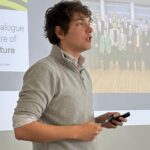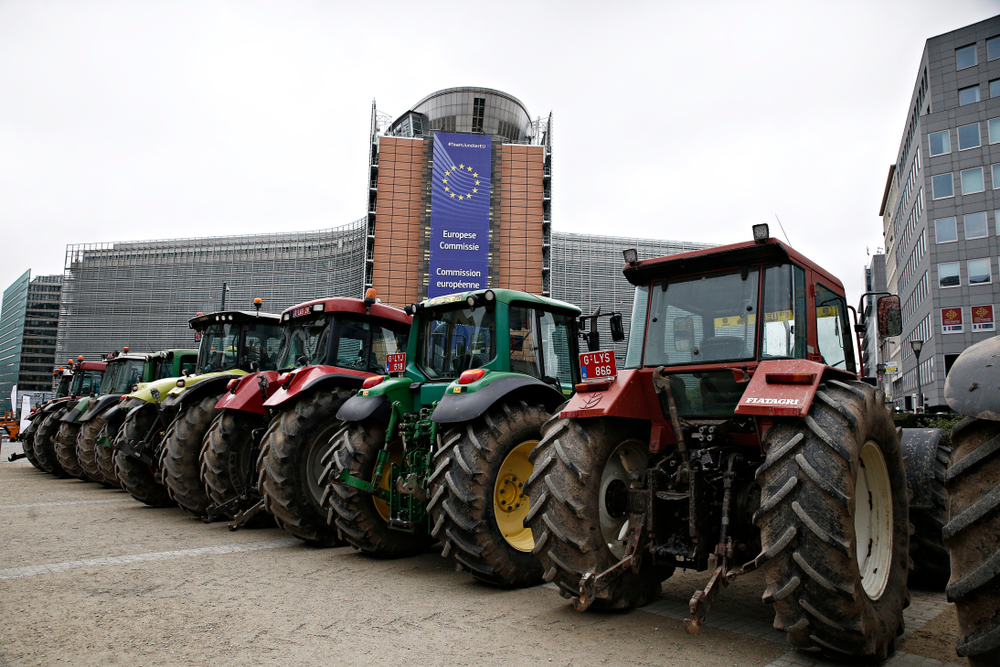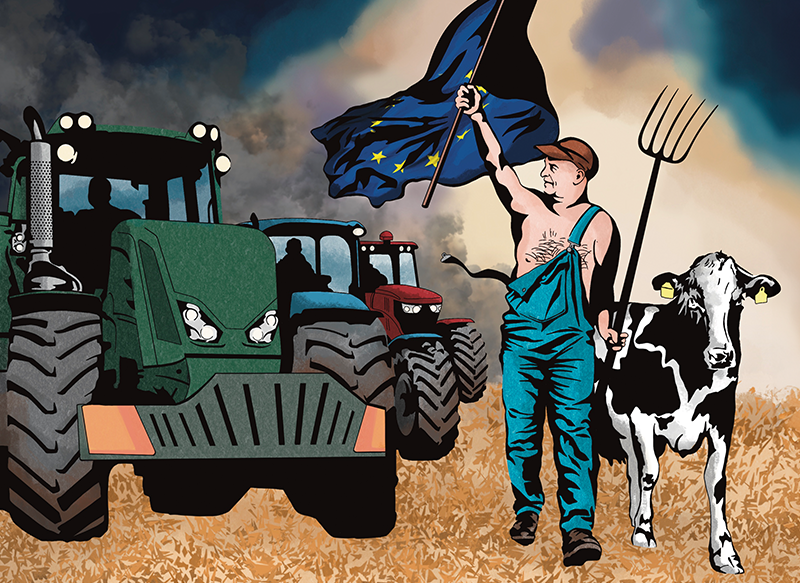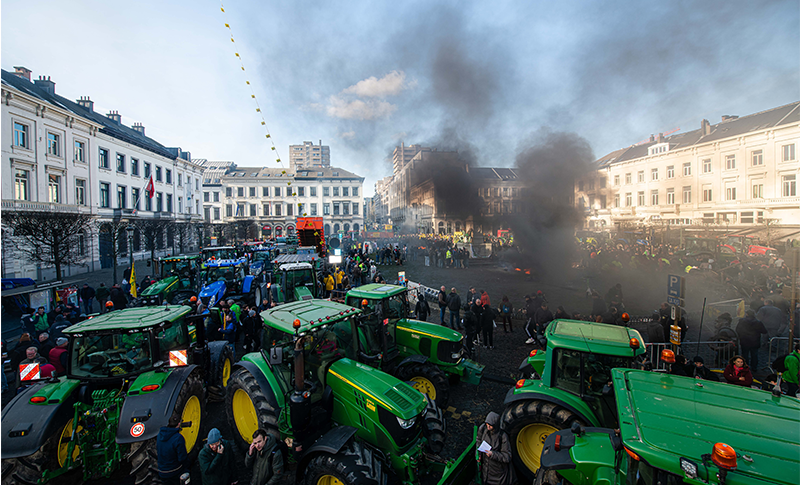Still working on the last section of your master’s thesis while also attending meetings in Brussels with EU Commission president Ursula von der Leyen to help shape future European agricultural policies. Few students can say they’ve had the same privilege as Peter van Meedendorp. He talked about it during a guest lecture for the course Agriculture, Food and Policy.
Half of Europe’s farmers is set to retire in the next fifteen years. That makes young farmers essential for the EU. Conversely, the European Common Agricultural Policy (CAP), and hence, the EU, is very important to young farmers. There is a lot at stake for both parties. Meedendorp knows all about it: in addition to being a crop farmer, he is also a WUR student and chair of the European Council of Young Farmers CEJA.
In this capacity, he was one of the selected 29 key figures EU Commission president Ursula von der Leyen invited to the table for a ‘strategic dialogue on the future of agriculture in the EU’. The dialogue took place against the backdrop of farmer protests escalating throughout Europe. WUR president Sjoukje Heimovaara was among the other 21. Her role ended with the presentation of the final report last September, but as CEJA chair, Meedendorp continues to closely follow the shaping of European agricultural policy. In February, the European Commission presented its vision on agriculture and food for 2040, which builds upon the strategic dialogue. The fact that young farmers are specifically seen as a point of focus in this vision is a win for Meedendorp and CEJA. The next step is to get this included in the further elaboration of the new CAP, the details of which are expected to be divulged later this year. Meedendorp will certainly keep a close eye on that process.
Guest lecture
The fact that he is both a WUR student and operates at the heart of Brussels’ policymaking led Meedendorp to be invited by the Agricultural Economics and Rural Policy Group to deliver a guest lecture for the Agriculture, Food and Policy course. He is, after all, uniquely suited to provide students with insight into the dynamics of Brussels’ policy-making and advocacy. Meedendorp provided students from the EU but also from other countries, such as Norway, India, Canada and the United States, with a fascinating peek into the European agricultural policy kitchen. He began by outlining what is at stake for young farmers. The availability of farming land, more a national than a European issue, to be sure, is a critical bottleneck given the ageing of European farmers. Older farmers hold on to their land until they are over seventy or eighty because it is their retirement fund. At the same time, what little land becomes available is frequently bought by institutional investors as it is seen as a valuable investment. As a result, young farmers face increasing challenges in acquiring the hectares they need. Moreover, access to capital is also a well-known problem young farmers face.
Sofa farmers
This threshold was increased even further by the strict conditions that are imposed on banks (Basel IV) to adopt higher liquidity standards to give out loans. ‘But “ground bound” farmers generally have lower liquidity as their assets are tied up in their land’, Meedendorp argues. Young farmers also miss out on European agricultural subsidies. ‘Many such subsidies are linked to hectares. In part, the subsidies are given to so-called sofa farmers: farmers who lease out their land. Active farmers are left behind.’
Other key points Meedendorp mentioned are skills and knowledge (young farmers must be jacks-of-many-trades, particularly in view of the increasing legal restrictions) and the habitability of the rural areas (‘if increases in scale mean only a few farms remain, as is the case in Romania, there will be insufficient provisions such as schools and shops.’). CEJA feels that these concerns deserve to be included in the European vision of agriculture and agricultural policy. Meedendorp has done all he can to get these issues included in the final report on the dialogue and in the vision.
Accepting defeat
No advocate, however, gets their way on all counts, and that includes Meedendorp. The students wanted to know how he handled that. What issues are you willing to compromise on, and what issues are non-negotiable? Must you sometimes defend things with which you don’t agree (‘of course, that is part of the negotiating game’), how do you accept defeat and retain your constituents’ mandate? What is the deal with formal power and informal power?
Some plenary sessions were more like theatrical productions or therapy sessions, especially when emotions took over
Meedendorp presented a clear narrative of CEJA’s considerations behind the scenes. On the negotiations, he said: ‘One would expect such negotiations to be highly structured. In reality, however, it is quite chaotic. Some plenary sessions were more like theatrical productions or therapy sessions, especially when emotions took over.’ Meedendorp provided the students with valuable insights: keep it cool, make sure you stay in touch with your constituents, neither underestimate nor overestimate the person you are talking with, even if they are high-ranking officials and, above all, know that the narrative often has more impact than the exact content. Reports are seldom read from cover to cover, so take heed of what you want the reader to take away from your message. ‘The narrative is extremely important.’
How democratic is such a dialogue?
Meedendorp also delivered a short lecture for interested students and employees of the Social Sciences group. An interesting point was made during the interactive part of the session: Doesn’t such a strategic dialogue in preparation for policy-making thwart the normal democratic process? ‘You grant lobbyists influence.’ Some members of the EU parliament were also doubtful, said Meedendorp. He doesn’t see it as an issue. ‘The dialogue serves to draft an outline from society’s centre-field. The actual policy and its implementation, and all the underlying legislation, are created through the usual democratic processes.’

Peter Meedendorp obtained his bachelor’s in international relations at Groningen University and is currently pursuing his master’s in economics of Sustainability in Wageningen. He was elected chair of the European Council of Young Farmers in June 2023, after having served as a board member for the Dutch Association of Young Farmers (NAJK) since 2021, where he was responsible for international affairs. In addition to his studies and role with CEJA, he runs a crop farming enterprise with his father in Onstwedde, Groningen

 Student Peter Meedendorp was one of the selected 29 key figures EU Commission president Ursula von der Leyen invited to the table for a ‘strategic dialogue on the future of agriculture in the EU’. The dialogue took place against the backdrop of farmer protests escalating throughout Europe. Photo Shutterstock
Student Peter Meedendorp was one of the selected 29 key figures EU Commission president Ursula von der Leyen invited to the table for a ‘strategic dialogue on the future of agriculture in the EU’. The dialogue took place against the backdrop of farmer protests escalating throughout Europe. Photo Shutterstock 

